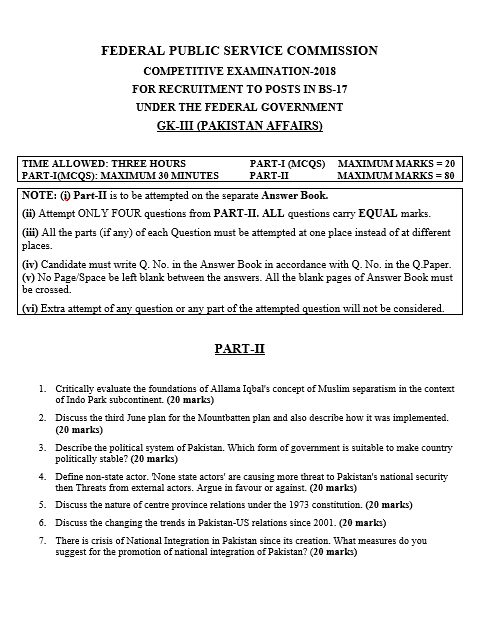CSS Pakistan Affairs Paper 2018
- Critically evaluate the foundations of Allama Iqbal’s concept of Muslim separatism in the context of Indo Park subcontinent. (20 marks)
- Discuss the third June plan for the Mountbatten plan and also describe how it was implemented. (20 marks)
- Describe the political system of Pakistan. Which form of government is suitable to make country politically stable? (20 marks)
- Define non-state actor. ‘None state actors’ are causing more threat to Pakistan’s national security then Threats from external actors. Argue in favour or against. (20 marks)
- Discuss the nature of centre province relations under the 1973 constitution. (20 marks)
- Discuss the changing the trends in Pakistan-US relations since 2001. (20 marks)
- There is crisis of National Integration in Pakistan since its creation. What measures do you suggest for the promotion of national integration of Pakistan? (20 marks)
Summary of Questions:
Critically evaluate the foundations of Allama Iqbal’s concept of Muslim separatism in the context of the Indo-Pak subcontinent.
Allama Iqbal’s concept of Muslim separatism was based on the idea that Muslims in India were a distinct nation with their own religion, culture, and political needs. He envisioned a separate homeland for Muslims to preserve their identity and safeguard their rights. His 1930 Allahabad Address laid the intellectual foundation for Pakistan, emphasizing self-governance for Muslims in North-West India to counter Hindu-majority domination.
Discuss the third June plan or the Mountbatten plan and also describe how it was implemented.
The Third June Plan, also called the Mountbatten Plan, proposed the partition of British India into India and Pakistan to resolve communal tensions. It included transferring power to two independent dominions and allowing princely states to choose their allegiance. Implemented in August 1947, the plan led to the creation of Pakistan and India, accompanied by large-scale migrations and communal violence.
Describe the political system of Pakistan. Which form of government is suitable to make the country politically stable?
Pakistan’s political system is a federal parliamentary democracy, where the prime minister holds executive authority. However, instability arises from power struggles, weak institutions, and centralization. A more inclusive federal system with strong provincial autonomy, robust judicial oversight, and democratic practices could enhance political stability and governance.
Define non-state actor. ‘Non-state actors’ are causing more threat to Pakistan’s national security than threats from external actors. Argue in favour or against.
Non-state actors are entities independent of state control, including terrorist groups, militias, or advocacy organizations. In Pakistan, non-state actors like extremist groups have destabilized national security, causing internal conflicts and undermining governance. These threats, often fueled by decades of regional instability, are arguably more immediate than external threats, requiring urgent counter-terrorism and deradicalization measures.
Discuss the nature of centre-province relations under the 1973 constitution.
The 1973 Constitution introduced a federal structure with greater provincial autonomy, balancing power between the center and provinces. However, tensions persist due to resource distribution and political disputes. The 18th Amendment further empowered provinces, yet unresolved issues in fiscal federalism and administrative authority continue to challenge center-province harmony.
Discuss the changing trends in Pakistan-US relations since 2001.
Post-9/11, Pakistan became a strategic ally of the U.S. in the War on Terror, receiving military and economic aid. Relations fluctuated due to issues like drone strikes, security concerns, and Pakistan’s ties with Afghanistan. Recent years have seen a shift toward a more transactional approach, with a focus on counterterrorism, trade, and regional stability.
There is a crisis of national integration in Pakistan since its creation. What measures do you suggest for the promotion of national integration in Pakistan?
Pakistan’s integration challenges stem from ethnic, linguistic, and socio-political disparities. Measures like promoting inclusive education, equitable resource distribution, fostering inter-provincial dialogue, and strengthening national identity can bridge divides. Ensuring representation, addressing grievances, and upholding justice and equality are crucial for fostering unity and integration.
